Contents:
- Restart of Iran nuclear program negotiations in Vienna brings cautious optimism
- Iraq: Political crisis deepens as possible exit emerges
- Finding ways to punish a defiant Taliban leadership
- The implication of the Zawahiri strike for Afghanistan and the Taliban
- Kuwait paves the way for early elections amid ongoing gridlock
Restart of Iran nuclear program negotiations in Vienna brings cautious optimism
Nazila Fathi
Non-Resident Scholar

A new round of talks over Iran’s nuclear program between top Iranian and U.S. officials proceeded on a much more positive note than expected. Negotiations started on Thursday, Aug. 4, in Vienna, in an attempt to revive the 2015 agreement that former U.S. President Donald Trump unilaterally pulled out of. The Iranian lead negotiator, Ali Bagheri Kani, and his American counterpart, Rob Malley, met in the Austrian capital after the European Union’s foreign policy chief, Josep Borrell Fontelles, suggested detailed steps to salvage the deal.
Russian Ambassador Mikhail Ulyanov, who also took part in the negotiations, told reporters outside Vienna’s Palais Coburg on Sunday that the discussions had moved in the right direction. Enrique Mora, the EU’s top official chairing the talks, added that he was “absolutely” optimistic about the progress so far, raising hopes that perhaps a breakthrough may be possible.
An agreement appeared imminent back in March, after 11 months of indirect talks between Tehran and Washington. But those negotiations collapsed when Iran demanded the removal of its Islamic Revolutionary Guards Corps (IRGC) from the U.S. Foreign Terrorist Organization list and that Washington provide assurances that no future U.S. administration would be able to abandon the deal. In 2018, President Trump walked away from the agreement, formally known as the Joint Comprehensive Plan of Action (JCPOA), and imposed crippling economic sanctions on Iran. Tehran retaliated by resuming its nuclear program. According to the International Atomic Energy Agency (IAEA), Iran is now approaching the critical point where it has enough fissile material enriched to near weapons grade for a nuclear weapon.
The Biden administration recently imposed further sanctions on Iran, targeting companies used by the country’s Persian Gulf Petrochemical Industry Commercial Company. The Islamic Republic, in turn, announced that it was activating hundreds of new and advanced centrifuges that had previously been installed at an underground nuclear site in Natanz.
It is still unclear if Iran and the West will be able to resolve their differences any time soon. The key question now is if Iran will insist on its previous demands. Iranian Foreign Minister Hossein Amirabdollahian said on Sunday that Tehran was seeking to revive the 2015 nuclear deal but added that the success of talks depended on Washington's flexibility. If no deal is reached, Iran’s economy will continue to suffer under the pressure of sanctions.
Follow on Twitter: @nazilafathi
Iraq: Political crisis deepens as possible exit emerges
Robert S. Ford
Senior Fellow

The breakdown of the political process in Iraq now centers around cleric and political leader Muqtada al-Sadr. He ordered his followers to withdraw from the interior of the Iraqi parliament on Aug. 2, but they immediately occupied the compound surrounding the building and organized for an indefinite stay. They thus still impede the work of the legislature. Sadr, who had had the largest parliamentary bloc until he ordered them to resign en masse, is physically occupying the parliament site as his ultimate trump card to stop a rival coalition, the Shiite Coordination Framework, from confirming a new prime minister and cabinet in the contest for control of ministries and the resources and patronage that comes with them. Sadr’s implicit threat of violence to block the political process also carries the risk that he will shoulder blame for government inaction in the face of infrastructure failures, especially electricity shortfalls amid soaring summer temperatures. Sadr notably was seeking to convince the non-Sadrist protesters as well as other tribal and civil society organizations to join his followers at the parliament. The large non-Sadrist Tishreen opposition movement notably so far has declined; Sadr militiamen killed many Tishreen protesters during street demonstrations that began in October 2019.
Sadr is therefore narrowing his demands. Sources from his camp have told media outlets that they will drop calls for the prompt trial of corrupt officials — there are plenty of corrupt Sadrist officials in the ministries, among others — and will also let demands for constitutional change wait. Sadr has, however, locked onto demands for the immediate dissolution of the parliament and new elections. This demand has support from the Tishreen movement and also from within the rival bloc, some of whose members were angry at their poor 2021 election showing. As always in Iraq, the details are the hardest part. The constitution requires the existing parliament to vote to approve its dissolution, along with an election budget and an election law. An interim government will then manage Iraqi affairs until a newly elected parliament approves a new cabinet. Sadr has no deputies in the existing parliament that must act on these items.
The political bloc wrestling with Sadr has proposed one of its leaders, militia head Hadi al-Ameri, negotiate a way forward with him. Ameri, an ambitious political figure in his own right, could marginalize his bloc’s current leader, former Prime Minister Nouri al-Maliki, whom Sadr detests, if Ameri can strike a deal with Sadr. However, Sadr so far has not accepted negotiating with Ameri, and he was cool to the idea of U.N. mediation last week. The big Ashura religious commemorations have slowed political activity over the past several days; but with the holiday concluding this week, talks among political figures about possible Sadr-Ameri discussions will pick up rapidly.
Follow on Twitter: @fordrs58
Finding ways to punish a defiant Taliban leadership
Marvin G. Weinbaum
Director, Afghanistan and Pakistan Studies

Finding that al-Qaeda chief Ayman al-Zawahiri had taken residence in Afghanistan was hardly surprising. Intelligence from multiple sources had for some time been reporting that the Taliban’s well-established close links to al-Qaeda remained intact. Taliban leaders had telegraphed their intentions to retain those ties during negotiations over the February 2020 peace agreement, when they refused to accept language calling for renouncing and severing their connections to the terrorist group. The best that U.S. interlocutors could achieve on paper was the Taliban’s promise not to allow any terrorist organizations to launch an attack on another country from Afghan soil. This apparently left the Taliban feeling that once in power they were free to offer hospitality to the successor to Osama bin Laden and ally in arms for more than 25 years. Still, even a defiant Taliban leadership undoubtedly understood the significance attached to harboring Zawahiri in the heart of Afghanistan’s capital. The question now becomes, what does the United States plan to do in response? Can it act in ways that punish Afghanistan’s rulers while avoiding harming the Afghan people?
Punitive actions could be targeted directly at the Taliban’s most senior leadership. A proposal being floated in Washington is to request the removal of the U.N. travel ban waiver that has allowed some of the Taliban’s high-ranking officials to travel internationally. This reinstituted ban would markedly affect their lifestyle by denying them their now accustomed opportunities to enjoy business-class travel to attend international conferences as well as engage with foreign leaders in the Gulf states and other regional capitals, visits that also bolster their regime’s claims to legitimacy. Different U.S.-promoted international sanctions could also be proposed, including ones akin to those imposed on the Taliban leaders’ finances late in their first emirate.
Fallout from the Zawahiri deception could come in other forms as well. Change may be felt in the substance and tone of U.S. diplomatic engagements with the Taliban. Although limited in the absence of formal political recognition of the Afghan regime, discussions that had been increasing over recent months on a range of issues may decrease. That said, any talks related to creating mechanisms to ensure the delivery of humanitarian aid and the stabilization of the Afghan government’s finances are unlikely to end. To be seen is whether U.S. domestic backing for generous aid to Afghanistan weakens in the wake of the Zawahiri affair. In particular, discussions on the Biden administration releasing $3.5 billion in frozen U.S. accounts to a reopened Afghan Central Bank could become more complicated. Moreover, the loosening of restrictions earlier this year affecting Afghan financial transactions and trade is now unlikely to expand and could be reversed. The U.S. may also choose to retaliate by upping criticism of the Taliban regime’s gender policies and refusal to yield to international demands to form a broadly inclusive government. Yet its displeasure with the Taliban notwithstanding, Washington is unlikely to begin encouraging budding armed resistance movements in Afghanistan’s provinces.
However U.S. policymakers decide to respond to Kabul’s duplicity of hosting Zawahiri, they must contend with the reality that, whether as insurgents or powerholders, the Taliban never altered their behavior in the face of sanctions or other threats.
Malavika Radhakrishnan, a research assistant to Marvin G. Weinbaum, assisted with this article.
Follow on Twitter: @mgweinbaum
The implication of the Zawahiri strike for Afghanistan and the Taliban
Sayed Madadi
Non-Resident Scholar

There are still many unanswered questions about the implications of the killing of Ayman al-Zawahiri in Afghanistan as the Taliban have yet to react beyond issuing statements of condemnation and staging anti-American protests. As much as the strike revealed hard evidence of the Taliban’s relationship with al-Qaeda, it also played into the group’s broader narrative about the untrustworthiness of the United States. That means it will most likely push the Taliban into isolation in the hands of its most extreme ideologues — those the outside world has no access to or relationship with. That could happen even if some elements within the regime cooperate with the United States and may have direct consequences for the ever-worsening human rights and socio-economic conditions in the country. Given these internal dynamics, the strike will also have a bearing on the relationship between the Taliban and their patrons in the Pakistani security establishment, who have favored certain groups within the Taliban over others. Moreover, this development is also likely to impact the trust other regional and international terrorist organizations have placed in the Taliban’s ability to offer them protection, incentivizing them to look for sanctuary elsewhere in the region and beyond or, less likely, to turn their guns against the Taliban.
Beyond that, the killing of Zawahiri cannot be the basis for a wider and more sustainable U.S. counterterrorism strategy. In many ways, the strike is not a testament to the effectiveness of “over-the-horizon” capabilities, but rather an example showcasing its limits. After months of intelligence gathering on Zawahiri’s whereabouts, it took two days after the actual operation for the U.S. government to confirm that they had, in fact, killed him. By comparison, President Barack Obama reported the successful completion of the operation that killed Osama bin Laden only hours later. As the security and terrorism dynamics in and around Afghanistan develop, it will be very difficult to rely only on over-the-horizon capabilities if the U.S. wants to act with precision and speed. Given the problematic track record of drone strikes, the likelihood of civilian casualties, among other risks, increases — further fanning the flames of the very problems that such a strategy aims to solve. After all, since the 9/11 attacks, every U.S. president has scored a major success in the so-called War on Terror; but it still seems far from over.
Follow on Twitter: @madadisaeid
Kuwait paves the way for early elections amid ongoing gridlock
Oliver B. John
Non-Resident Scholar

On Aug. 2, Kuwait’s Crown Prince Sheikh Mishal Al Ahmad Al Sabah, who has assumed many of the duties of the amir, formally dissolved parliament, triggering elections roughly two years early. He was responding to long-term Kuwaiti frustration with the country’s political and economic paralysis. Although Sheikh Mishal also swore in a new cabinet on Aug. 1, we are unlikely to see any real political movement until after the elections, which constitutionally must be held within two months.
Kuwaitis argue the current power-sharing disputes between the appointed cabinet and the elected parliament reflect longstanding problems. These include splits within the ruling family playing out in parliament, pervasive corruption, and a system where parliament appears more able to block government action (for good or ill) than it is to adopt needed reform legislation.
Kuwait’s long history of consultative government is enshrined in the country’s constitution. Elected members of parliament have considerable power to approve or block legislation, question ministers, and remove them through votes of no confidence. While parliamentary authority holds the government accountable, disputes between parliament and the government have led to considerable gridlock, blocking needed reforms. Although the country’s oil wealth has allowed it to delay addressing problems, this has come at a cost, including hurting its credit rating, and increasing its economic vulnerability.
On June 22, in his speech on behalf of the amir, Crown Prince Mishal highlighted the country’s serious challenges and sharply criticized both the government and parliament for the impasse. He announced that he would dissolve parliament and called on Kuwaitis to elect representatives committed to working with the government to move the country forward. Stressing the need for Kuwaitis to take responsibility for pushing reform, he urged voters to vote for candidates who put Kuwait’s interests ahead of their own personal agendas.
Many Kuwaitis express frustration with domestic problems. They welcomed Crown Prince Mishal’s speech but want to see leadership to implement change. The question remains whether they will be motivated enough to actively push for change, particularly now that higher oil prices are masking ongoing economic challenges. At least some might resist reforms that could bring future benefits to the country but prove painful in the short term. This leaves Kuwaitis hoping the elections will bring change but simultaneously fearing more stasis and a continued decline in the country’s relative standing in the region.
Photo by ALEX HALADA/AFP via Getty Images
The Middle East Institute (MEI) is an independent, non-partisan, non-for-profit, educational organization. It does not engage in advocacy and its scholars’ opinions are their own. MEI welcomes financial donations, but retains sole editorial control over its work and its publications reflect only the authors’ views. For a listing of MEI donors, please click here.













